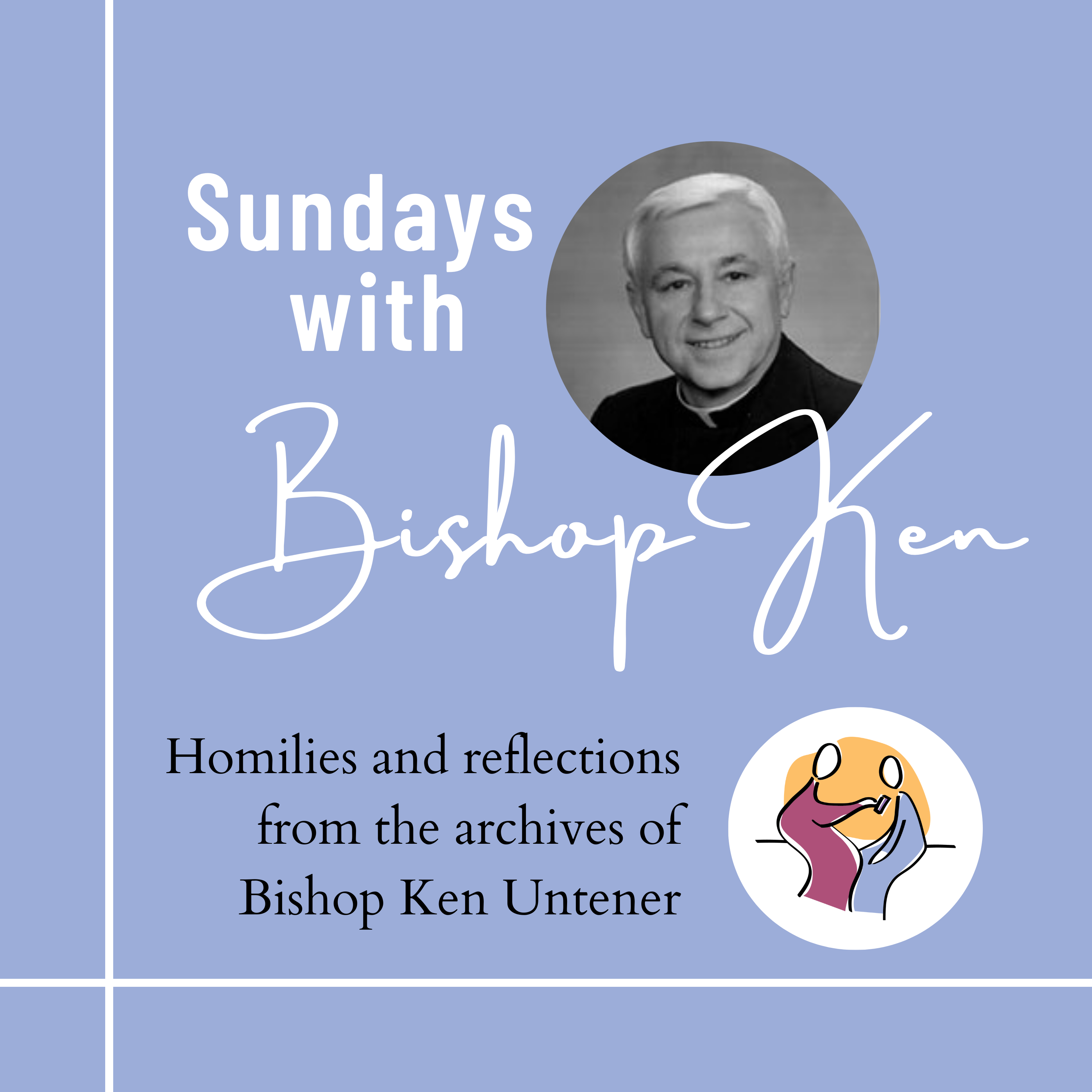Episode Transcript
[00:00:06] Speaker A: This is Sundays with Bishop Ken.
Thanks for sharing some quiet time with the Lord today. Our guest reader is Fr. Burt Gome, a senior priest from the diocese of Saginaw in Michigan. Father Burt was a priest in the diocese when Bishop Ken was its shepherdess.
[00:00:33] Speaker B: A reading from the Holy Gospel according to Mark.
Jesus summoned the twelve and began to send them out two by two and gave them authority over unclean spirits.
He instructed them to take nothing for the journey but a walking stick, no food, no sack, no money in their belts.
They were, however, to wear sandals, but not a second tunic.
He said to them, wherever you enter a house, stay there until you leave.
Whatever place does not welcome you or listen to you, leave there and shake the dust off your feet in testimony against them.
So they went off and preached repentance.
The twelve drove out demons and they anointed with oil many who were sick and cured them.
The gospel of the Lord.
Notice how the gospel describes this sending of the twelve.
He began to send them out two by two and gave them authority over unclean spirits.
Unclean spirits?
We're not talking here simply about the devil taking possession of a person.
People at that time attributed all evils to unclean spirits or demons.
For example, on the Sea of Galilee, people thought dangerous wind and rain and waves were the result of demons or unclean spirits at work.
Sickness was another example. Anything bad was thought to be because of unclean spirits at work.
Jesus came to take on evil in all its forms. He came to make things right.
Now he sends his disciples to be part of the same task.
We have here the dim beginnings of the church.
Disciples working with Christ in the great enterprise of overcoming evil and transforming all creation into a new world, their mission is clear. They know what they're sent to do.
Now, how do they do it?
If they're sent to overcome unclean spirits, evil, what's their battle plan? Modus operandi strategy.
That's what the rest of this gospel passage is about. It's a remarkable passage.
Take nothing for the journey but a walking stick. Take no food, no money.
Where are the weapons? Where are the funds? Where is the power?
That's not how the crusaders went out.
They had helmets and swords and the power of kings behind them.
That's not how the emperor Constantine or the emperor Charlemagne did it. They exercised their civil powers and used the might of law.
But that's how jesus did it. He took on evil by surrounding it with goodness, absorbing it and dissolving it.
Instead of weapons, he used words.
Instead of fighting, he forgave instead of killing, he raised people to life.
Instead of a military banner, he used his own life as a sign.
Instead of a battle cry, he cried his own tears.
Instead of working crowds into a frenzy of hatred for the enemy, he fed them loaves and fish.
Instead of cutting off heads, he washed feet.
Instead of crossing swords, he carried the cross.
Jesus didn't beat up on evil. Jesus absorbed evil and dissolved it.
That's how his disciples were to do it. And that's how his disciples did it.
We have the battle report in this gospel passage.
So they went off and preached repentance. They drove out many demons and they anointed with oil many who were sick and cured them.
Oil?
What kind of a weapon is oil?
I'll tell you what kind.
It's the oil of kindness. It's a sign and instrument of the tenderness of God.
It's a symbol of Jesus battle plan, modus operandi strategy, a symbol of the way of life. He sent his disciples to live.
Before Christianity was ever called Christianity, it was called the way.
It's a different way of living.
We need to keep that in mind.
And we need to keep in mind that in just the same way jesus sent his disciples, he sends us too.
I'm not sure we think much about that.
Each of us as individuals, all of us as a church, are sent into the day in, day out circumstances of our own lives to take on evil, to preach mostly by example, heal, cure the sickness of sin, to absorb evil and dissolve it.
By doing this, we participate in the work of the Lord in bringing about the reign of God, when all evil will be overcome, when all creation will reach its destiny.
We're not spectators. We're disciples participating in the Lord's own work.
We commit ourselves to this every time we pray the our Father, thy kingdom come, thy will be done on earth as it is in heaven.
[00:06:38] Speaker A: Thanks for joining us today. If you like this week's reflection, subscribe on your favorite podcast platform.
For daily reflections. During the seasons of Advent, Christmas, Lent, and Easter, subscribe to the Little Books app found on the Apple or Google Play stores. The podcast is brought to you free of charge from Little Books. To help support our ministry, please consider donating by clicking on the Donate button now. And of course, why not tell a friend about this podcast?
Sundays with Bishop Ken is produced by Little Books of the Diocese of Saginaw. For more about little books and great resources for the whole family, visit littlebooks.org, dot.


